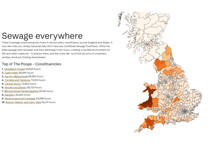I came through Port Talbot a couple of months ago and for the first time I saw blue sky above that town. Lime trees were vivid green and blossom was everywhere. The coke ovens had just shut due to Tata’s decision to use electric arc furnaces instead of blast furnaces, resulting in the loss of many jobs this coming September.
The closures have been on the cards for a long time. Still, many voices argue that the decision came too abruptly and that there should be a slower transition.
The people in Port Talbot have been living under the clouds for decades. Their conundrum manifests as a trade-off between having well-paid jobs and having clean skies. Welcome to wid and west Wales where we don’t have that particular dilemma. We’re only being asked to look at steel structures that generate electricity – turbines - or transmit it – pylons - to places like Port Talbot.
We should have a wide-ranging discussion on energy, including where and how we generate it, how we pay for it, how much we should use, and whether there should be compensation schemes for people near to any part of the energy network.
Transitioning from fossil fuels to all electric requires enormous changes, not just in Port Talbot. Look at heating. Altering gas or oil boilers to air-source-heat-pumps is not straightforward, I know, I had one installed privately. Changing boilers should be done properly or it ends up costing more to correct problematic installations as has happened to some households under the ECO4 scheme.
What about transport, probably an even harder nut to crack. Just electrifying a small section of the railway network, Cardiff to Swansea, was cancelled due to costs spiralling to nearly half a billion pounds. Dare I mention the private car. At current unsustainable levels of car use, exchanging all of them to electric will use staggering amounts of electricity.
We absolutely need to get to net zero as soon as possible. The science is clear and our earth is not waiting for humans to make up their minds on how to get there. It’s also clear that many of the poorest people on our planet are already suffering catastrophic consequences from our decades of dithering.
Back to the discussion. On-shore wind turbines are most efficient situated on windy hills but mustn’t destroy peatlands. Out at sea is great as long as they don’t upset bird migration routes and sea life. Off-shore turbines still need pylons or cabling on-shore to get the energy to where it’s needed. Solar farms have their place but I prefer farmers to have their shed roofs covered first, perhaps under some scheme where energy firms pay for the panels and farmers get their electricity for free. All new homes need to have solar panels and air-source-heat-pumps; planning should be strict on that. ECO4 needs to be replaced with a scheme where there is true accountability.
If we all want to charge phones and cars, run washing machines, cook and watch the news, we ought to be prepared to put up with some of the disadvantages of our energy network. But first of all we should look at energy consumption. Cutting back is the quickest way to achieve net zero. The first 1000 or so KwH per household should be cheap with prices rising rapidly after that (while certain disabled people should receive extra cheap units) and standing charges should be abolished.
Have the residents of Port Talbot ever received any community benefit for living under a polluted sky? Perhaps we should count our lucky stars that we live in mid and west Wales.





Comments
This article has no comments yet. Be the first to leave a comment.